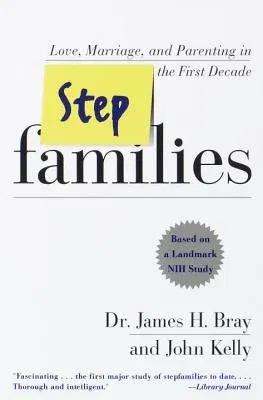Based on a landmark longitudinal study, the nation's leading expert on
stepfamilies reveals his breakthrough findings and offers the first
detailed guide to easing the conflicts of stepfamily life and healing
the scars of divorce.
There are more than twenty million stepfamilies in America. For most of
them, the simple, daily issues that challenge every family are even more
anxiety-provoking. After conducting a comprehensive nine-year-long study
funded by the National Institutes of Health, Dr. James H. Bray has
written an invaluable book that explains why over half of all
stepfamilies fail and reveals the strategies that help the others
succeed.
A stepfamily is assaulted on all sides by difficult and often divisive
questions. How much control should a stepparent have over a stepchild?
How much authority should a nonresidential parent exert over a child?
How should a difficult former spouse be handled? How does an "ours" baby
change the emotional dynamic in a stepfamily? Why is there a lack of
"honeymoon effect" during the first years of stepfamily life?
The purpose of Stepfamilies is to answer all the important questions
of stepfamily life--to fill in the knowledge gaps that undermine so many
stepfamilies today and, crucially, to learn the effect of stepfamily
life on children. Based on one of the largest and longest studies of
stepfamily life ever conducted, Stepfamilies interweaves the stories
of real families to illustrate such study findings as how:
a stepfamily has its own natural life cycle
a stepfamily takes several years to develop into a family unit
a stepfamily is at greatest risk during the first two years
a stepfamily ultimately coalesces into one of three forms
a stepfamily must solve four basic tasks in order to succeed
a stepfamily can help heal the scars of divorce
Filled with emotional, gripping stories, Bray's findings pinpoint the
three major transitions in stepfamily life and identify the riskiest
issues that can throw a family into crisis. Bray is the first to
identify the several distinct forms that stepfamilies take and to
explore which types of stepfamilies are more vulnerable than others and
why. He also describes the natural life cycle of stepfamilies and basic
tasks all stepfamilies must undertake to succeed. With a wealth of
insight into the positive effects of remarriage, Bray shows how a
loving, well-functioning stepfamily can lessen the trauma of divorce and
restore a child's and family's sense of security.
Most stepparents remarry with the highest hopes and new resolutions for
a better life. Never before have their unique needs been addressed in
depth. Through insightful case studies and practical advice,
Stepfamilies reveals how a strong, stable stepfamily is as capable as
a nuclear family of nurturing healthy development, of imbuing values, of
setting limits and boundaries, and of providing a structure in which
rules for living a moral and productive life are transmitted, tested,
rebelled against, and ultimately affirmed. Bray's positive message and
fascinating findings--many of which defy intuition--will put
stepfamilies on the road to lifelong harmony.

